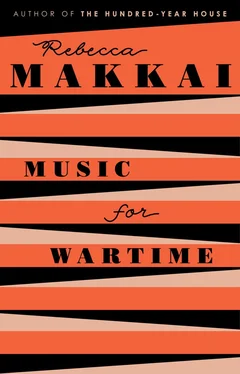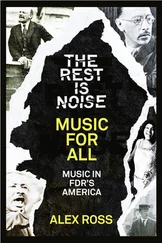On the seventh day, the only female student, a young Jewish woman whom Aaron’s father had once dated, collapsed from hunger and exhaustion. He used to take her for coffee across the street. He used to study his poetry and history downstairs while he waited for her lesson to finish. She had strong little fingers, perfect for the violin. She would live to stagger out of the building at the end, but she would die the day after from having eaten too much too quickly. Aaron tried to feel her hunger, but his bladder was full and his stomach pressed out into the elastic of his pajamas. He imagined instead being bloated with starvation, but this didn’t fit with his picture of the small, dark woman in a flowered spring dress, lying in the corner among fallen sheaves of music.
They were sick, all of them, unable to stay awake much. If they had indeed moved the piano to block the door, they must have worried they wouldn’t have the strength to move it back when the fires and gunshots ended. At some point, they had to accept that they would die in the room. Those who were married would have written farewell letters to spouses they feared already dead. Aaron tried to feel despair in the music — in the scratch, below the note, of bow against string.
The first to die, though, was Zoltán, a Hungarian student who was not Jewish but who, like the other gentile in the room, had stayed maybe out of loyalty and maybe out of a musician’s fear of violence. Violinists need thin hands; they tend to be small people. As Aaron himself grew larger and broader this year, his fingers had started to overreach the strings and bump together. His teacher talked about switching him to cello. On the eighth day, when terrible smells rose from the streets, thicker and muskier than the burning before, Zoltán vanished into the supply closet for several minutes. When they heard him coughing, they called his name. He emerged, his lips and chin and hands covered in a pale yellow powder. He began to cry, and the tears made lines through the yellow. Radelescu was the first to realize Zoltán had been eating from the cake of cheap, powdery rosin. If they had water, they must have given him some, but during the night he died — whether from the rosin or starvation or fear, they didn’t know. Aaron wondered what they had done with the body. His picture of a room barricaded by a piano gave them no choice but to keep it there or throw it out the window. If he could find a way, he would ask his father.
But that next day, the streets had begun to quiet down. There were no more gunshots. In the afternoon they sent out one of the students, a Jewish boy Aaron’s father hadn’t known — the youngest, sixteen and brave. To do this, they must have moved the piano. Aaron imagined the boy had forged some system of communication to tell the others either to stay put or to run out the door and through the streets to the house of the second gentile student, the star pianist, whose wife, Ilinca, would be waiting, hoping he was alive. They might have had a string, a long string like Theseus used in the labyrinth, which the student dragged out the door by one end. If he tugged once, it meant to stay put. Two tugs meant run. But the boy was gone only four minutes, and then they heard a gunshot.
It was possibly the last gunshot of the pogrom, but they did not know this. They stayed an extra day, a day when the collapsed girl could have found a doctor. They stayed and then using the last of their energy they stumbled through the streets and (Aaron’s father perhaps having left behind some of his famous luck) found Ilinca at home.
As Aaron finished his story, the piece ended. He took this as a sign that he was right about the string and everything else. He had been tuned to the correct frequency. He tried swallowing to test his sore throat, but every swallow made it worse.
The five times Aaron knew for certain he had been right, in chronological order: (1) the synagogue in Bonn; (2) when his aunt was pregnant; (3) his teacher was getting a divorce; (4) the goldfish was going to get sick; and (5) right now.
A young couple he didn’t know had sat down on the second stair from the bottom, and the woman was leaning on the man, her head on his shoulder. People whispered while Radelescu and Aaron’s mother shuffled through some music, and Aaron heard the man say to the woman, “He’ll never fully have it back.”
“Astounding, though,” the woman said.
Aaron hadn’t thought there was much missing at all, besides the finger. Concentrating on the room now, he became sure that what many people were whispering was “No, he’ll never have it back,” and he imagined the three ghosts — the woman, the young boy, the yellow-faced Hungarian — crying silently for the way Radelescu’s hands had changed. The Hungarian ghost shook his head, and invisible rosin snowed over the room.
The ghosts and Aaron’s father alone would know the real difference, and so Aaron watched his father’s face a long time. What he saw there, he was certain, wasn’t disappointment but a host of other, terrible things: guilt, sadness, anger. Primarily guilt, which Aaron guessed was from his leaving, from his luck.
Aaron watched now as his father and Radelescu conferred. Breathe, Aaron commanded the people in the room, and he felt them all exhale.
“Mr. Radelescu has invited our young rabbi to join him,” Aaron’s father announced to the room, and then looked right at him, on the stairs, and so did all the guests. He didn’t know how his father had seen him sitting in the darkness, but now he felt everyone’s gaze surround him, tie him in a knot. He was the fly now in the web, not the spider. He shouldn’t have changed his clothes.
Aaron stayed still a moment, but he knew from his father’s look that he couldn’t remain on the stairs. In his pajamas and bare feet, he walked down, between the parted couple, to join his father at the fireplace. He felt like the boy he’d been at five years old, when he routinely came down before bed to kiss the guests and be admired. He wanted to glare at his father, to express his embarrassment in some public way, but he knew this was the worst night for that and so he pulled himself up and held it in. Radelescu said something in Romanian, and a handful of guests understood and laughed.
“Violin part of the Trout Quintet ,” his father whispered. “Just the fourth movement. Mr. Radelescu and your mother will fill in the other parts.” It was what he’d been practicing for two months now, often with his mother covering all the rest on the piano, and so he was relieved. Aaron retrieved his violin from the cabinet and quickly tuned. He guessed his father had planned this trio days ago but kept from telling Aaron so he would not get nervous. He knew how his son thought too much.
As he started to play, Aaron’s throat was parched and throbbing, but he knew he could ignore it. He angled himself so he could watch Radelescu’s right hand. He could see, as he’d seen last night at dinner, the stub extending just beyond the base knuckle of his ring finger, hardly a bigger bump than if the finger had simply been closed in a fist.
Once Aaron relaxed into it, the music beside him made his own playing better, and he found himself taking rubatos where he never had before, the accompaniment holding his notes suspended in the air until he felt the moment to move on. He knew his tone was not perfect, his fingering not exact, but this was what people meant when they talked about playing with passion and feeling. He hoped his father was paying attention.
Most people in the room would not be thinking about those ten days in the music school, but about the twenty years Radelescu had spent in prison, unable to play the violin. Aaron knew they all felt privileged to be here, to witness the great man’s exclusive, private return. He’d been out of prison only the four months since Ceausescu’s fall — and here, in this suburban living room, he tried the steadiness of his hands.
Читать дальше












